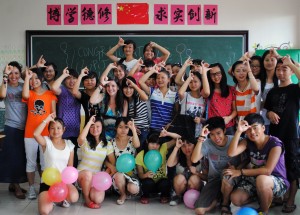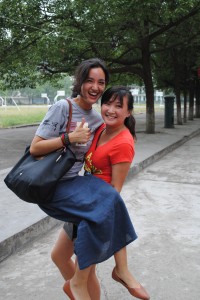At various points in my life, someone has said the following to me: you don’t know what you have until it’s gone.
In the context of Jishou, I’d say I’ve had that feeling twice—even after diligently telling myself that I would not, under any circumstances, have it the second time.
Well, even the best laid plans….
Day one back, and I throw myself into a crash course of cultural rehabilitation. Breakfast takes place at a Jersey diner, complete with oily hash browns and a chatty waitress who calls me “Honey,” as in, “Honey, you want lemon or cream with that?”, “Honey, how’s it taste?”, or “Honey, you got the morning off of work or something?”
“No,” I say, looking up from my eggs. “I actually just got back from a long trip. I was out of the country for two months.”
“Where?”
“China.”
“Huh.” She proceeds to sit down, making my booth a little less lonely. “And what did you eat there?”
I pause. Perhaps she should have asked, “What didn’t you eat there?”, but I guess not everyone knows the full range of culinary options in the Middle Kingdom, what with fish-smelling tofu and the three sounds of Guangdong. I decide to tell her what seems most interesting. She nods her head as I talk, saying, “You don’t say….” and “Wow!” before going on to her other customers.
Somehow, this conversation seems wanting, so I move on to the next great bastion of human interaction: the New Jersey Department of Motor Vehicles. Sure, you might say that you’re going thereto register plates, or as in my case, renew a license, but everyone knows that the real reason people visit is for the thrill of long lines, a smorgasbord of accents, and a healthy dose of bureaucracy (“What do you mean you didn’t bring your six points of identification?”).
Wait….
WHAM.
And all of a sudden, I feel like I’m in China all over again. Well, a decidedly cleaner shadow of China, but not too far off. Change the English to mangled Mandarin and switch the DMV with a line for tickets at a Chinese train station, and I wouldn’t feel like I was in too different of an environment. Voila. Magic.
This instance of seeing bits of China around me has in some ways made things come full circle. I spent a lot of this summer thinking about the ways that China reflected back the life that I knew back home. I looked for commonality to link what seemed two decidedly different places in my life. Familial obligation, whether or not within the Confucian scope, is a powerful force. I knew this from my own life, and my students showed it to me in their own lives. Whether it was through ancestral worship or planning a trip to Shenzhen to see a father who was working to support them, they were involved in their lineage. I also spoke to students about their frustration over the complacency acquired by many Chinese college students, and I thought of some people I knew back at Princeton.
Perhaps it seems a simplistic conclusion to say that both cultures reflect back on each other, but I would argue that as the returning wander, it is a deceptively easy thought to overlook. I spent so much of my time abroad analyzing things in comparison to what I know, so why should I not do the opposite as I return home? The Jishou experience does not end when one leaves Jishou; it ends when one thinks that it no longer holds relevance.
Given the experiences that I’ve had over two summers, I’d say that the relevance will be around for quite a long time.



You must be logged in to post a comment.